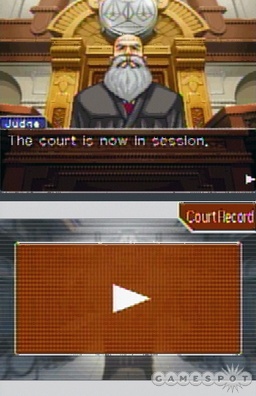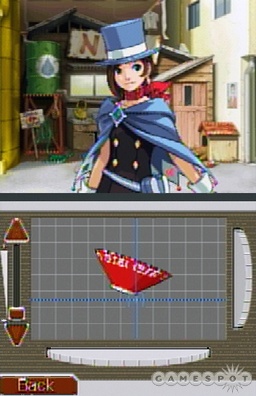Apollo Justice Hands-On
We play through the first case of Apollo Justice's young career. Move over Phoenix Wright, there's a new ace attorney in town.
Phoenix Wright and his merry band of misfits garnered quite a following over the young lawyer's first three games. But now Phoenix Wright is out and has been replaced by young upstart Apollo Justice. It's surprising that Capcom has gone to such lengths to change things up; after all, the first three games all followed the same formula and basic game mechanics. Replacing the main character isn't all Capcom has done; there are new gameplay mechanics and improved visuals as well. We've played through the first case in the game and have some spoiler-free, hands-on impressions.

The first case--or turnabout, as the game calls them--is very similar to the first case in previous games. As is typical, the first case doesn't involve any investigation and is mainly geared toward showing you the ropes of being a trial lawyer. It is a bit longer than the average starting case, however, and you've got to use your head a bit more than usual to save your client. Right off the bat you're introduced to Apollo Justice, an attorney who is very similar to Phoenix Wright, right down to the spiky hair. Apollo is nervous about trying his first case and gets some encouraging words from his mentor in the courtroom lobby. He then meets his client, a memorable character who is accused of murdering someone over a game of poker. Apollo doesn't exactly exude confidence, but ready or not, he must defend his client in court.
From there the proceedings move into the courtroom, which has been redrawn and now features a lot more detail. While the courtroom looks new and is home to a few familiar faces--such as the judge and prosecutor, Winston Payne--we learned that at least seven years have passed since the last game. In the first part of the trial we heard testimony, pressed witnesses, and were slowly introduced to some of the new mechanics. Anyone who played the last case in the first game will be happy to know that 3D evidence is back. You can examine certain pieces of evidence by manipulating them via the touch screen. For example, we flipped a playing card over to see what color its back was, and later in the case we checked a bottle's contents and its surface for fingerprints.
Thanks to a mystical locket, Phoenix had the ability to tell when people were lying and then was able to force the truth from them by breaking their psyche locks. Apollo has a similar ability, which is demonstrated in the first case. At one point the screen briefly turned black and white, and Apollo was able to sense that the witness was lying because he noticed she scratched her neck every time she told a lie. Once Apollo figured out this "tell," we could hit a button labeled "perceive" and Apollo would spring into action and bring the witness's deceitful ways to light.
The last--and coolest--new feature we saw during the somewhat lengthy first trial was the ability to re-create a crime scene in three dimensions and then manipulate objects in real time. At first we were simply pointing to people and objects via a top-down 2D perspective as seen in previous games. But then the camera swooped down, and everything was turned into a basic 3D model, and we were able to actually move objects around with the stylus. This new perspective lets you analyze the crime scene in a whole new way and promises to be a big part of the game.

After numerous twists, turns, and shocking revelations, the first case came to a close. While we were a bit unsure about how we'd adjust to a new main character, the transition was painless thanks to the way Capcom has mixed the old with the new. You can check out a brief demo of the game on your PC at ace-attorney.com, or if you're the patient type, you can wait just a few more weeks until February 19 for the full game.
Got a news tip or want to contact us directly? Email news@gamespot.com
Join the conversation